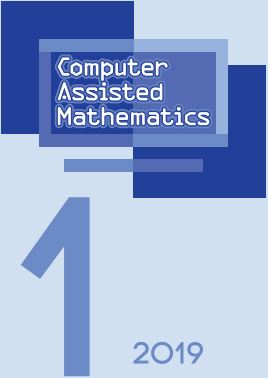ELLIPTIC INTEGRALS, FUNCTIONS, CURVES AND POLYNOMIALS
Abstract
The extensive subject of elliptic integrals, functions and curves, being at the junction of analysis, algebra and geometry, has numerous applications in mechanics and physics. Two approaches to the study of elliptic functions have become classical, namely that of Jacobi and that of Weierstrass. Two separate chapters were devoted to these two approaches in the (well-known) course of modern analysis by Whittaker and Watson, without attempting to unite them [1, §§XX, XXII]. Also, two separate chapters are devoted to these two approaches in the latest version (1.0.22 on March 15, 2019) of the NIST Digital Library of Mathematical Functions [2, §§22, 23]. An wide-spread inculcation “explained” that the Weierstrass approach is more suitable for theoretical research, whereas the Jacobi elliptic functions are more common in applications. But, in fact, this dichotomy is artificial, and studying elliptic functions and curves may (and must) be combined in an algebraic approach, establishing a canonical “essential” elliptic function which linear fractional “symmetry” transformations acquire the simplest forms. Although such a natural and fundamental object to be (rightly) called the Galois essential elliptic function, was introduced only recently (already in our millennium), its use has quickly become fruitful, not only and not so much for the effective recovery of known results but also for achieving new calculations that once seemed too cumbersome to pursue. The methodological significance of this natural algebraic approach, which undoubtedly transcends back to the (revolutionary) contribution of Galois, is clearly manifested by its application to several fundamental problems of classical mechanics with the achievement of non-standard, capacious and highly efficient solutions.
References
E. T. Whittaker and G. N. Watson, A Course of Modern Analysis, 4 ed., Cambridge, UK: Cambridge Univ. Press, 1927.
F. W. J. Olver, et al, eds. [DLMF] NIST Digital Library of Mathematical Functions. Release 1.0.22 of 2019-03-15. [Online]. Available: http://dlmf.nist.gov.
S. Adlaj, “Galois elliptic function and its symmetries,” N. N. Vassiliev, ed., in Proc. 12 International Conference on Polynomial Computer Algebra, PDMI RAS, St. Petersburg, 2019, pp. 11–13.
S. Adlaj, Thread equilibrium in a linear parallel force field, Saarbrucken, Germany: LAP LAMBERT, 2018 (in Russian).
S. Adlaj, “On the second memoir of Evariste Galois ´ ’ last letter,” Computer Tools in Education, no. 4, pp. 5–20, 2018; doi: 10.32603/2071-2340-4-11-26.
S. Adlaj, “An analytic unifying formula of oscillatory and rotary motion of a simple pendulum (dedicated to 70 birthday of Jan Jerzy Slawianowski),” I. Mladenov, A. Ludu, A. Yoshioka, eds., in Proc. Int. Conf. Geometry, Integrability, Mechanics and Quantization’, Sofia, Bulgaria, pp. 160–171, 2015.
S. Adlaj, “Back to solving the quintic, depression and Galois primes,” N. N. Vassiliev, ed., in Proc. 11 International Conference on Polynomial Computer Algebra, PDMI RAS, St. Petersburg, 2018, pp. 12–16.
S. Adlaj, “Torsion points on elliptic curves and modular polynomial symmetries,” Presented at the joined MSU-CCRAS Computer Algebra Seminar on September 24, 2014. [Online]. Available: http://www.ccas.ru/sabramov/seminar/lib/exe/fetch.php?media=adlaj140924.pdf.
S. Adlaj, “Modular Polynomial Symmetries,” N. N. Vassiliev, ed., in Proc. 7 International Conference on Polynomial Computer Algebra, PDMI RAS, St. Petersburg, 2014, pp. 4–5.
S. D. Meshveliani, “Computer proof for a ‘mysterious’ equality for quartic roots,” 17 Workshop on Computer Algebra, Dubna, Russia, 2014. [Online]. Available: http://compalg.jinr.ru/Dubna2014/abstracts2014_files/1199.pdf.
H. Ruhland, Constructing equalities. [Online]. Available: http://semjonadlaj.com/ConstructingEqualities.pdf.
A. G. Greenhill, The applications of elliptic functions, NY: MacMillan & Co, 1892.
S. Adlaj, S. Berestova, N. Misyura, and E. Mityushov, “Illustrations of rigid body motion along a separatrix in the case of Euler-Poinsot,” Computer Tools in Education, no. 2, pp. 5–13, 2018; doi: 10.32603/2071-2340-2018-2-5-13. {}bibitem{1} S. Adlaj, “Galois axis,” in {{}it Proc. Scientific Conference ’Infinite-dimensional Analysis and Mathematical Physics’}, Moscow, 2019, pp. 9–11.
S. Adlaj, “Galois axis,” in Proc. Scientific Conference ’Infinite-dimensional Analysis and Mathematical Physics’, Moscow, 2019, pp. 9–11.
S. Adlaj, “Dzhanibekov’s flipping nut and Feynman’s wobbling plate,” N. N. Vassiliev, ed., in Proc. 9 International Conference on Polynomial Computer Algebra, PDMI RAS, St. Petersburg, 2016, pp. 10–14.
S. Adlaj, “Mechanical interpretation of negative and imaginary tension of a tether in a linear parallel force field,” Selected Works of the International Scientific Conference on Mechanics ‘Sixth Polyakhov Readings’, Saint Petersburg, 2012, pp. 13–18.
F. Lamarche, Modified Arithmetic-Geometric Mean (clarified and answered). [Online]. Available: https://math.stackexchange.com/questions/391382/modified-arithmetic-geometric-mean. Last accessed on June 3, 2019.


